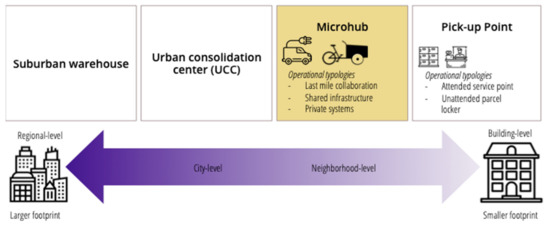Urban freight distribution has confronted several challenges, including adverse environmental, social, and economic impacts. Many city logistics initiatives that use the concept of Urban Consolidation Centers (UCCs) have failed. The failure of many UCCs does not mean that the idea of additional terminals or microhubs should be rejected. There is limited knowledge about the advantages and disadvantages of using microhubs, requiring further exploration of this concept.
To expand this knowledge, research by Katsela et al. combines 17 empirical cases from Europe and North America to develop a framework for classifying different microhubs typologies. This research presents an integrated view of the cases and creates a common language for understanding microhub typologies and definitions.
The research proposes microhubs as an essential opportunity to improve urban freight sustainability and efficiency and one possible step to manage the challenge of multi-sector collaboration.

The research investigates how microhub implementations differ geographically regarding objectives, operations, and challenges faced. The core contribution is the proposed framework that provides a foundation and shared language for identifying microhubs. An important implication of this research is that it establishes a definition for microhubs. This definition can be used in micro consolidation practices. This contribution is essential because it helps scholars distinguish the different types of consolidation. This research also makes a necessary contribution to the typology of the microhubs as it reviews microhub implementations in various cities around the world and categorizes them by creating a typology to clarify the differences between implementation styles. Further, this research highlights the sustainability aspects and objectives of the framework. Finally, the findings of this research shed light on micro consolidation practices taking place in diverse cities all around the world.
